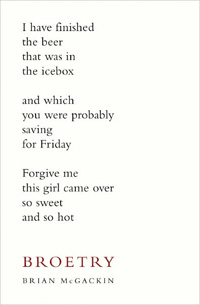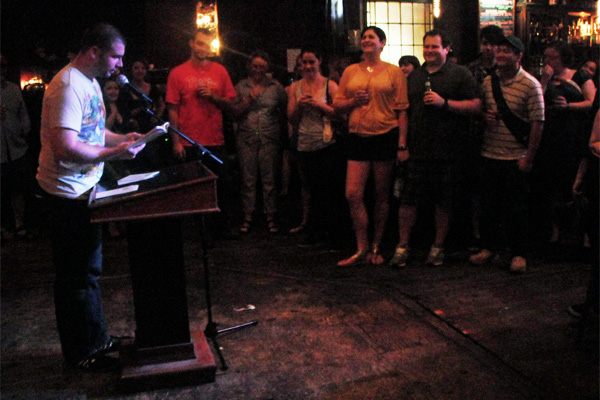National Broetry Month: The Guttenberg Bible
April is National Poetry Month, and some of you are probably already celebrating by quoting Emily Dickenson or John Keats. No? Just me then.
For everyone who thinks poetry has to be about high-minded intellectual pursuits or daffodils in spring, we are going to feature a more relaxed form of prose. For the next three weeks, we’re going to share a poem from Broetry by Brian McGackin, who tackles important, real-world topics like beer, frozen pizza, and Bruce Willis.
It was difficult to select just a few poems to share, but it seemed logical to start with one that featured the formation of the universe. This poem contains all those very important poetry themes: the indifference of God, the history of the printed word, and the Police Academy sequels. Enjoy, and happy National Broetry Month.

The Guttenberg Bible
From Broetry by Brian McGackin
In the beginning God created heaven and
Steve Guttenberg, and God saw that it was good,
so He let Steve take care of the rest. And Steve said,
“Let there be light,” and there was light. And Steve said,
“Let there be Police Academies,” and there were
six sequels. And then, in a moment of true
genius, Steve said, “Let there be Tom Selleck and Ted
Danson,” and there were Three Men and a Baby.
And Steve saw that it was good. It was so, so good.
And God was pleased, and all was right with the world.
But then Steve said, “Let there be High Spirits,” and,
“Let there be It Takes Two,” and finally, for some
strange reason, “Let there be Zeus and Roxanne, about
a dog and a dolphin who become best friends,
wouldn’t that be so cool? Guys? God? Anybody?”
And it was not good. It was not good at all.
(I know because I saw it in theaters when
I was eleven; even then I knew it sucked.)
So then Steve said, “Let there be Dancing with the Stars,”
but by that point God had stopped listening long,
long ago, and Steve was on his own. Maybe he
should have considered a job in publishing;
I hear Gutenberg is a good name for that.
—
For more information on Broetry by Brian McGackin, visit the book’s offficial page. To chat with Brian, like his Facebook page and follow him on Twitter.


